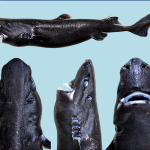
People are freaking out about the recent outbreak of shark attacks. This recent massive increase in shark attacks has media outlets claiming that a shark is “seeking human targets“, “sharks are hunting humans“, and maybe even developing a taste for human fish. O’ my god grab the children and run for the hills!
Maybe it was just a matter of time before sharks went on the hunt as a matter of retribution. So how many shark attacks have there been in Mexico in the last month? 3
Sharks have attacked three surfers in less than a month, two fatally, near the southwestern resort of Ixtapa-Zihuatanejo.
That’s up from one last year of one. Graphically you can see that there is a 300% increase in attacks.

Thankfully the Mexican Navy has been called on to track down and kill these death wielding beasts.
PLEASE PEOPLE! Although tragic, three attacks and two deaths is not extraordinary that searching for pattern or cause is necessary. You don’t see people freaking out about pigeon related deaths. An increase of one to three is hardly a pattern. In four tosses of a penny this morning I just got 1 head and 3 tails…it happens. The fact that the media is in a frenzy combined with Mexico actually spending money on searching for causes and using sophisticated Naval ships to exterminate the sharks is nothing short of absurd. Let’s get a bit of perspective…
U.S. soldiers who’ve died in Iraq since 2003: 3,909
American soldiers who died in World War II: 405,400 (approx. 100,000 per year)
Military deaths (world total) in World War II: 20 million (approx. 3.3 million per year)
Civilian deaths (world total) in World War II: 30 million (approx. 5 million per year)
Casualties in the Vietnam War (all sides, military and civilian, including later suicides and Khmer Rouge massacres): 9.1 million
Americans killed by guns in the U.S. each year: 30,000
Americans killed by tobacco in the U.S. each year: 418,000
Americans killed after being struck by police Tasers in 2004: 40
Convicts executed in the U.S. in 2006: 53
Convicts executed in China in 2005: 1,770
U.S. murder rate: 5.9 per 100,000
U.S. traffic fatalities each year: 39,000
Traffic fatalities each year (world total): 1.2 million
People killed in the Sept. 11, 2001, attacks in New York City: 2,993
People injured/killed by lightning each year in the U.S.: Struck: 700, Killed: 70
Flu deaths in the U.S. each year: 36,000
People killed by the Dec. 26, 2004, Indian Ocean tsunami: Dead: 186,983 Missing: 42,883
Deaths from obesity per year in the USA: 112,000
I will take a shark any day over a Twinkie, lighting strike, the flu, a tsunami, Taser, cigarette, hand gun, war, or a car.






everything changes with a little perspective
I am reminded, for several reasons, of this strange screenshot i took a few years ago.
A lot of the problem here is that people intuitively expect rare random events to be spread out uniformly. They aren’t; there’s always a lot more “clumping” than people would naively expect. What most people think of as a “random” pattern would actually be considered a systematic pattern by anyone who understands probability.
Nice point ebohlman
OTOH, while shark attacks are not spread out uniformly throughout the year, in my unscientific observations (i.e. off the top of head) it seems shark attack increases are seasonal. Coinciding with the increase in activities in the water during summertime. Many times these summer hotspots also coincide with known shark territories or breeding grounds.
If we were seeing sharks adapt to a seasonal food source then we would see an increase each year in number of attacks per location and frequency of locations. With sample sizes between 1-4 there isn’t enough resolution to even consider that at this time.
Maybe it’s jut my basic misanthropy, but, to paraphrse Edward Abbey on the subject of bears: “If the tourists are going to trespass in the shark’s kitchen, you are going to have to expect the sharks to harvest a few trespassers.”
I currently live in a neighborhood where we co-exist with bears. I saw one last night crossing the road in front as I hiked up the mountain. Everyone living there is aware of bears and takes appropriate measures. You often hear people talking very loadly and clapping so they don’t surprise any bears lurking behind the trees.
Points is, agreeing with Graculus, too know about where you live or where you visit ahead of time. I think shark attacks were much less 50+ years ago because packaged vacations were less and people read up more about the environment they were visiting (I’m talking out of my ass here, just an opinion). Now everything is taken more often than not taken for granted, people visit the natural side of places less often. When they do its in a way that obscures or misrepresents nature (think swamp safari’s where you cruise as fast as possible on skimmers and aggravate crocs/gators to get the awesome jaw opening death grip pic to show off to your friends back in Idaho and make up BS about how close you were to certain death… for example).
As civilization grows, we seem to grow apart from nature as we directly depend on it less. Our fear of it lessens as we gain an illusion of control over our surroundings. Someone else harvest the trees, trims the logs, splits the wood. We just buy it in a box and throw it in the fireplace. Someone else grows the veggies, tends the garden, picks them come harvest time, packages them into neat little 1lb. bundles. We just purchase it from a grocery store and stash it away in our fridge for use later. In fact, you buy your veggies pre-diced or your food already prepared and cooked. Just have to warm it up. Someone else is catching the fish, cleaning and fileting the fish, taking the fish to market. We just buy it from the grocer.
There is a distinct disconnect between people and nature and consumers and producers. A lack of appreciation fostered by laziness and a false sens of security.
I am having a deja vu from September 2001 when sharks were biting off Florida. People blamed larger beachgoer populations, prey depletion due to fisheries, and shark feeding operations.
But then I remember that, according to recent articles by Boris Worm and Ransom Meyers, sharks were at 10% of their historical abundance. So, shouldn’t there be a general trend of fewer shark attacks? Or is this trend masked by “clumping” or aggregative effects?
That paper was for global shark populations if i remember correctly. There could be stable local populations while globally, populations are decreasing. Like I said above, some of the attacks might be clustered near areas of high productivity (temperate continental shelves) or traditional breeding grounds. Attacks tend to be reported from similar areas right?
how many sharks have decided NOT to attack a human?
I’d like to see the news organizations give the number of shark attacks per 1000 visitors at that or any other beach. Then I’d like to see the traffic fatalities per 1000 for the people traveling there.
I think that would put the numbers into perspective.
How about the number of sharks killed each year by humans? Hundreds of thousands.
Good post. I’ve written about this myself before and I previously did a little work for the Global Shark Attack File. If anyone is interested you can visit the site (http://globalsharkattackfile.com/) and there is an excel spreadsheet that lists the data about recent attacks from all over the world for each year. The numbers are so small that any increase or decrease isn’t significant as far as “sharks going after people” or anything like that, but every summer there seems to be a panic when the first few bites occur.
Peter re #8
I live and dive in Florida. I’m a heck of a lot more fearful of driving on I95 than diving on our reefs. There are always a few morons I encounter who do stupid things like grab a resting nurse shark’s tail. I always root for the shark in cases like that.
My father works in construction. He was once comissioned to build a brick wall using “random” differently patterned bricks. Accordingly, for each new brick he just chose one at random. At one point the person for whom he was building the wall told him that it “wasn’t random enough” because occasionally there would be clusters, patterns, etc. *headdesk*
Humans: the only species that will go out and systematically exterminate anything that threatens them.
A good overview of the psychology behind this is in
http://www.schneier.com/crypto-gram-0702a.html
(“The psychology of security”)
Short summary: the evolved heuristics humans use to estimate
danger don’t work very well in modern society.
@#16, Kcanadensis:
Have you ever seen how an adult male lion treats newborn cubs that it identifies as being sired by another lion?
I find it tiresome when such aspersions are cast at my specie. While it is true that we have some unsavory characteristics, we certainly do not have a corner on that market. Please note that chimpanzees in the wild will go on hunting expeditions and kill most violently. We are not the only specie that does things that appear unsavory or “bad.”
Fortunately,[1] they didn’t bite it completely off. But that’s not important now. In response to ebohlman’s comment at #2, let me point to an excellent graphical demonstration of this very point over at Peter Norvig’s site (scroll down to D7).
[1] I suppose some might disagree.
Go see their film and help save sharks from extinction.
http://www.sharkwater.com/
@ Crudely Wrott, #18.
It is animal behavior to kill, I will not lie, but we are the only species that’s able to get on a boat and have an over-active trigger finger. It’d be different if they killed the animal down themselves with only their teeth and finger nails, that’s what chimpanzees and lions do.